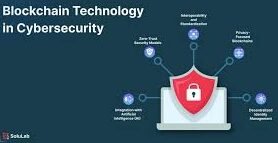Blockchain technology is a decentralized ledger system that records transactions across multiple computers in a secure and immutable manner. Each block contains a list of transactions, and once recorded, data in any given block cannot be altered retroactively. This unique attribute makes blockchain an ideal solution for enhancing data security across various applications and industries. Even if some nodes are compromised, the majority of honest nodes maintain the integrity and availability of the data, ensuring continuous operation.
Decentralization and Its Security Benefits
Decentralization is a core feature of blockchain technology, distributing data across multiple nodes rather than storing it in a central location. This reduces the risk of data breaches since there is no single point of failure. Each node in the network holds a copy of the entire blockchain, ensuring data integrity and availability even if some nodes are compromised. Decentralization mitigates the risks associated with centralized data storage, such as single points of failure and centralized breaches. In a decentralized network, data is replicated across multiple nodes, making it resilient to attacks.
Immutability and Tamper-Resistance
The immutability of blockchain ensures that once data is written to the ledger, it cannot be altered or deleted. This tamper-resistant nature is achieved through cryptographic hashing and consensus mechanisms, making it extremely difficult for malicious actors to manipulate data. Immutability provides a reliable audit trail, crucial for maintaining data integrity in security-sensitive environments. Blockchain’s immutability is achieved through consensus mechanisms like Proof of Work (PoW) or Proof of Stake (PoS). These mechanisms require network participants to agree on the validity of transactions before they are added to the blockchain. Once confirmed, altering a block’s data is computationally infeasible, as it would require redoing the work for all subsequent blocks, providing a strong defense against tampering.
Cryptographic Security
Blockchain employs advanced cryptographic techniques to secure data. Each block in the chain is linked to the previous block through a cryptographic hash, creating a secure chain of blocks. Public-key cryptography is used to verify transactions, ensuring that only authorized parties can initiate and approve data exchanges, thus enhancing overall security. Cryptographic security in blockchain involves using public and private keys to secure transactions. Public keys act as addresses, while private keys authorize transactions. The use of cryptographic hashing links each block to its predecessor, ensuring the integrity of the entire chain. Advanced cryptographic algorithms protect against forgery and unauthorized access, making blockchain a robust security solution.
Enhanced Identity Management
Blockchain offers robust solutions for identity management by providing a decentralized and verifiable digital identity system. It eliminates the need for central authorities to manage and verify identities, reducing the risk of identity theft and fraud. Blockchain-based identity management systems ensure that personal data remains private and secure. Blockchain-based identity management systems, such as self-sovereign identities, empower individuals to control their digital identities. These systems store identity information on the blockchain, allowing users to verify their identity without relying on central authorities. This reduces the risk of identity theft and ensures that personal data is protected from unauthorized access.
Secure Data Sharing
Blockchain facilitates secure data sharing by providing a transparent and verifiable method for exchanging information. Smart contracts, which are self-executing contracts with the terms of the agreement directly written into code, can automate and enforce data sharing rules. This ensures that data is shared only with authorized parties under predefined conditions. Blockchain facilitates secure data sharing through its transparent and decentralized nature. Smart contracts automate and enforce data sharing agreements, ensuring that data is exchanged under agreed conditions. This reduces the need for intermediaries and enhances trust between parties, making data sharing more secure and efficient.
Supply Chain Security
In supply chain management, blockchain enhances security by providing a transparent and immutable record of all transactions and movements of goods. Each participant in the supply chain can verify the authenticity and integrity of products, reducing the risk of counterfeiting and ensuring traceability from origin to consumer. In supply chain management, blockchain provides end-to-end visibility and traceability. Each transaction, from raw material sourcing to final delivery, is recorded on the blockchain. This immutable record allows participants to verify the authenticity of products and track their journey, reducing the risk of counterfeiting and ensuring product integrity.
Data Provenance and Traceability
Blockchain’s immutable ledger provides a clear and verifiable history of data provenance and traceability. This feature is particularly valuable in sectors such as pharmaceuticals, food safety, and art, where verifying the origin and authenticity of products is critical. Blockchain ensures that all data entries are traceable and trustworthy. Blockchain’s ability to provide a verifiable history of data entries is crucial for industries where data provenance is essential. For example, in the food industry, blockchain can track the origin and journey of food products, ensuring safety and quality. In the art world, blockchain can verify the authenticity and ownership history of artworks, protecting against forgery and theft.
Secure Financial Transactions
Blockchain technology underpins cryptocurrencies like Bitcoin and Ethereum, providing a secure platform for financial transactions. By eliminating intermediaries and using cryptographic security, blockchain reduces the risk of fraud, hacking, and unauthorized transactions. It also ensures transparency and traceability in financial operations. Blockchain’s secure framework underpins cryptocurrencies and other financial applications. By eliminating intermediaries, blockchain reduces transaction costs and speeds up processing times. Cryptographic security ensures that transactions are tamper-proof and transparent, providing a secure and efficient platform for financial operations.
Decentralized Applications (DApps)
Decentralized applications (DApps) run on blockchain networks and offer enhanced security by operating without a central authority. DApps leverage the security features of blockchain, such as immutability and cryptographic security, to provide secure and transparent services across various domains, including finance, healthcare, and supply chain management. DApps leverage blockchain’s security features to offer decentralized and transparent services. By operating without a central authority, DApps eliminate single points of failure and reduce the risk of censorship and fraud. These applications span various domains, including finance, gaming, and social media, enhancing security and trust for users.
Secure Voting Systems
Blockchain has the potential to revolutionize voting systems by providing a secure and transparent platform for elections. Each vote can be recorded as a transaction on the blockchain, ensuring that it is immutable and verifiable. This reduces the risk of tampering and fraud, enhancing the integrity and trustworthiness of the electoral process. Blockchain-based voting systems provide a transparent and tamper-proof platform for elections. Each vote is recorded as a transaction on the blockchain, ensuring its integrity and immutability. Voters can verify their votes, and the public can audit the election process, reducing the risk of tampering and enhancing trust in the electoral system.
Smart Contracts and Automated Compliance
Smart contracts on blockchain enable automated compliance and enforcement of contractual agreements. These self-executing contracts reduce the need for intermediaries, minimizing the risk of human error and fraud. Smart contracts ensure that all parties adhere to agreed-upon terms, enhancing security and trust in business transactions. Smart contracts are self-executing contracts with the terms directly written into code. These contracts automatically enforce and execute agreements based on predefined conditions. By reducing the need for intermediaries and manual enforcement, smart contracts enhance security, reduce costs, and ensure compliance with agreed terms.
Healthcare Data Security
In healthcare, blockchain enhances data security by providing a decentralized and immutable record of patient information. It ensures that medical records are secure, tamper-proof, and accessible only to authorized personnel. Blockchain can also streamline data sharing between healthcare providers, improving patient care while maintaining data privacy. Blockchain in healthcare secures patient data by providing a decentralized and immutable record. This ensures that medical records are accurate, tamper-proof, and accessible only to authorized personnel. Blockchain can also facilitate secure data sharing between healthcare providers, improving patient outcomes while maintaining data privacy and security.
Intellectual Property Protection
Blockchain offers a secure method for protecting intellectual property by providing verifiable proof of ownership and creation. It allows creators to register their work on a public ledger, ensuring that their intellectual property rights are protected. This reduces the risk of infringement and unauthorized use, providing a secure platform for managing digital rights. Blockchain protects intellectual property by providing a secure and verifiable record of ownership and creation. Creators can register their work on the blockchain, ensuring that their rights are protected. This reduces the risk of infringement and unauthorized use, providing a secure platform for managing and enforcing intellectual property rights.
Regulatory Compliance
Blockchain can help businesses achieve regulatory compliance by providing a transparent and immutable record of transactions and activities. It simplifies the audit process and ensures that all data is accurate and verifiable. Blockchain’s traceability and transparency features make it easier to comply with regulations in finance, healthcare, and other industries. Blockchain simplifies regulatory compliance by providing a transparent and immutable record of transactions and activities. This makes auditing more straightforward and ensures that all data is accurate and verifiable. Businesses can use blockchain to demonstrate compliance with regulations, reducing the risk of legal penalties and enhancing trust with regulators.
Future Prospects of Blockchain in Data Security
The future of blockchain in data security looks promising, with ongoing advancements and increasing adoption across various sectors. Emerging technologies like quantum-resistant cryptography and interoperability solutions are expected to further enhance blockchain security. As blockchain technology continues to evolve, it will play an increasingly vital role in safeguarding data and maintaining trust in digital transactions. The future of blockchain in data security is promising, with ongoing innovations and increasing adoption. Emerging technologies like quantum-resistant cryptography will enhance blockchain security, while interoperability solutions will allow different blockchain networks to communicate seamlessly. As blockchain technology continues to evolve, it will play an increasingly vital role in securing data and maintaining trust in digital transactions.
Detailed Exploration
Understanding the role of blockchain in data security requires a deep dive into its technical aspects and practical applications. Below, we expand on the key points to provide a comprehensive overview of how blockchain enhances data security across different domains. Blockchain technology operates on a peer-to-peer network, where each participant (node) maintains a copy of the blockchain. Transactions are grouped into blocks, and each block is linked to the previous one through a cryptographic hash. This structure ensures that the blockchain is both transparent and secure, as any attempt to alter a block would require changing all subsequent blocks across the network.
Blockchain technology offers significant advantages for data security through its decentralization, immutability, and cryptographic security features. By enhancing identity management, secure data sharing, and regulatory compliance, blockchain provides a robust framework for protecting sensitive information. As the technology continues to advance, its role in data security will become even more critical, safeguarding digital assets and ensuring trust in the digital age.







